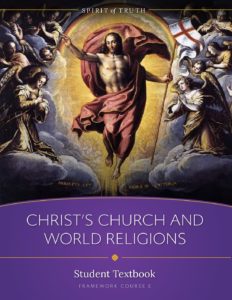
Overview
This course examines various major world religions through a lens of comparison to the Catholic Faith with the goal of strengthening students’ own Catholic faith. Students will come to understand what the Church teaches regarding salvation and how the Church relates to non- Catholic Christian faiths and other non-Christian faith traditions.
- Spirit of Truth, High School Course E Teacher’s Guide
- Spirit of Truth, High School Course E Student Textbook
- Spirit of Truth, High School Course E Student Workbook
- Final Exam
- Final Exam Study Guide
- Final Exam Answer Key
- Final Exam Essay Form A
- Final Exam Essay Form B
- Final Exam Essay Form C
- Glossary
- Topical Index
- Index of Citations
Units
On the night before He died, at the Last Supper, Jesus prayed with His Apostles. The heart of His prayer was simple; He asked the Father to give His followers the grace of unity: “that they may be one” (John 17:11), so that “the world may know that you sent me, and that you loved them even as you loved me” (John 17:23). The Father answered Jesus’ prayer. He sent the Holy Spirit to build up the Church that Jesus established on earth. He gave us the Sacrament of Baptism to make us members of His Church and unite us to Christ and one another. The other Sacraments He gave us to strengthen the bond created by our Baptism and heal that bond when it is broken by sin. God did not, however, take away our free will or force unity on us. He left us a choice. And that means the same fallen human nature that led men to crucify Jesus has also splintered the Father’s family, the Church. All baptized people—Catholic or not—are members of Christ’s Body. Baptism is our entry into the Church. Through our Baptism we enjoy communion with Jesus Christ, and with one another. Full communion with the Church, however, requires more than simply Baptism. It requires that we 1) profess our faith in all the Church teaches as divinely revealed, including the efficacy of her seven Sacraments, 2) participate in the Sacraments according to our age and station in life, and 3) accept the authority of the pope and the bishops he guides. The extent to which we adhere to these three criteria determines the extent to which we are incorporated into the Body of Christ. Accordingly, full communion with Jesus can only happen within the Catholic Church. In this unit, however, you will learn the Catholic Church is bigger than many Catholics in America think it is. It is important to know that with the Jewish people in particular, interreligious dialogue has a unique character. While the Jews are not Christians and do not share creeds, Sacraments, or ecclesial structure with the Catholic Church, they are our spiritual forefathers. This “family connection” enriches our dialogue with the Jewish people. It gives us more points of connection than with any other non-Christian faith and in turn enhances our ability to achieve the primary goals of our dialogue with them: to grow in respect for one another, to strengthen our common witness on issues of peace and justice, and to deepen in mutual contemplation of God’s providential plan for man’s salvation. After Judaism, Islam is the non-Christian faith tradition closest to communion with the Catholic Church. The Catholic Church teaches that, like us, those who practice the religion of Islam profess to worship the one and merciful God, who will judge mankind on the last day, though they have a different and, at times, erroneous conception of Him. But while we share many commonalities with our Orthodox and Protestant brothers and sisters and with the Jewish people, Islam differs much more significantly from Christianity. The Catholic Church is the one true Church. She is the Church established by Jesus Christ, built upon the foundation of the Apostles, led by the successor of St. Peter, and tasked with transmitting the graces of salvation and sanctification through the Sacraments. But just because the Catholic Church is the one true Church does not mean that she rejects every belief held by every other religion. Rather, she recognizes that other religions contain reflections of rays of truth. And wherever authentic truth, goodness, and beauty are found, there also is God. Non-Christian and non-Abrahamic religious traditions present a unique challenge for interreligious dialogue. Many of their beliefs are completely foreign to us in the West, and many are outright contradictory to the Truth we find in the Catholic Church. Nevertheless, commonalities still exist, and those points of agreement can be an entry point for building relationships and engaging in dialogue. Each of us has our own part to play in ecumenical and interreligious dialogue—in engaging in conversations with those who share our faith in Christ and in those who do not yet know Christ. God has called each of us to spread the Good News, but how we do that depends on our age, vocation, state in life, interests, activities, and even where we live. There are different ways to evangelize and different ways we grow in love and respect for people of different faith backgrounds. Regardless of how we participate in ecumenical and interreligious dialogue, the Church calls us to approach it with a deep reverence and hunger for truth; respect for the dignity of other peoples, faiths, and cultures; knowledge of what other religions believe; and knowledge of what our own Faith teaches.

